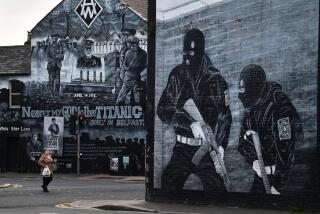Taxi Drivers Brave a Menacing Gauntlet in Belfast’s Bomb-Scarred Ghettos of Fear
- Share via
BELFAST, Northern Ireland — “In London your worst fear is someone sick in the cab, here it’s a bullet in your head,” said a Belfast taxi driver who is thinking about quitting his job.
Fear haunts Belfast’s taxi fraternity because seven drivers have died at the hands of paramilitaries in the past 15 months, mostly in the bomb-scarred ghettos of the city.
Other taxis have been hijacked while paramilitaries found out the driver’s religion.
“We’ve all got a gut reaction there will be more killings,” said one taxi firm owner, adding, “God knows, we’re terrified.” He was unwilling to be identified for fear of losing his life.
The “Cabbie Killings” are the latest twist in Northern Ireland’s bitter sectarian and political conflict which has pitted Protestant against Catholic communities.
Around 3,000 people have died in the last two decades in one of the world’s longest-running guerrilla conflicts.
The “Cabbie Killings” have caused some taxi drivers to give up their jobs, sometimes under pressure from their wives. Others are taking precautions to try and foil the gunmen’s plans.
“It’s striking fear and paranoia into all drivers,” said Brian Day of the Amalgamated Taxi Proprietors’ Assn.
The Northern Ireland Office, the ministry responsible for the British-ruled province, is talking with taxi firms about what to do about the paramilitaries’ attacks, which are mostly on Catholics.
“Dial-A-Catholic” is how Protestant paramilitaries have adapted the “Dial-A-Cab” slogan.
Killers have shot drivers in the back of their heads. In some cases drivers have been ambushed while walking from their vehicle to the pickup address.
At the depots callers are now questioned carefully about who they are, how many passengers there are and how old they are.
“But there’s only so much you can do,” said another taxi firm manager. “You see they’re very vulnerable and for the gunmen they’re soft (easy) targets,” he said.
“If you see three fellows in leather jackets you just don’t bother,” said one driver who works the grim ghettos of this split city where Irish Republicans and those loyal to British rule mark out their territory with graffiti and flags.
At taxi depots those on the desk who field calls and allocate jobs are under agonizing pressure.
Veronica Magee, the daughter of taxi driver Samuel Bell, who was shot dead in early April, said she had turned down a job with a taxi firm just before her father was killed.
“I was afraid I might send some poor taxi driver out on one of those sort of jobs,” she said.
She heard about the shooting of an unidentified taxi driver on the radio. “I would never have believed in a million years it was daddy.”
Bell, like many other drivers, had taken down his cab roof sign which the killers can use to identify the driver as Catholic or Protestant.
In this deeply divided community, someone’s religion can be established by a name, a telephone number or simply by the taxi firm.
“Sammy thought taking the sign down could have made the difference between life and death--obviously he was wrong,” said one driver of the 55-year-old Bell, a Protestant who converted to Catholicism to marry.
In talks with the British government depot managers have suggested easing rules governing taxis to try and conceal the drivers’ religion from his passengers. A sign on your cab is at present a legal requirement.
John O’Hara, 42, was killed in mid-April after the caller deliberately used a Catholic name to put the cab firm at ease.
“Doing that lulls you into a false sense of security. There’s no cast-iron guarantees that any job is safe,” said O’Hara’s depot manager. “You have to learn to live with it.”
O’Hara’s wife was inconsolable. Sixteen years ago Protestant paramilitaries had shot dead her first husband as he walked home. “It’s bad enough going through it once but to see it happen a second time . . . , “ said one relative.
More to Read
Sign up for Essential California
The most important California stories and recommendations in your inbox every morning.
You may occasionally receive promotional content from the Los Angeles Times.










